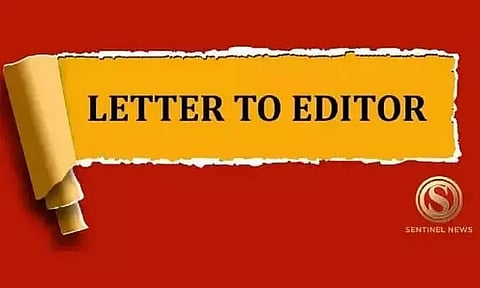
- Home
- Live Blog
- Breaking News
- Top Headlines
- Cities
- NE News
- Sentinel Media
- Sports
- Education
- Jobs

Rapido/Uber
Through the columns of your esteemed newspaper, I would like to draw the attention of the authorities of cab services that are offered in the city of Guwahati by agencies such as Rapido, Uber, Ola and so on.
After the COVID-19 pandemic, many citizens of Guwahati are being harassed over fares. The drivers demand extra fares from passengers over and above that shown in the app itself. Many media channels have covered this issue. When the drivers are asked as to why they demand extra money, all they say is: "We are not gaining any profit". As a student, I do not think that this a legitimate reason to demand extra money from us because in the end we also try to meet our needs through savings.
Sometimes we get late for classes and so we book an Uber or Rapido to arrive on time. If the fare shows Rs 50 they demand Rs 80/100. When we refuse to pay then they cancel the ride. For how long should we suffer? If they have problem with the profit margin then they should protest against the company and raise their demands with practical reasons such as hike in fuel prices or essential goods and so on. How is harassing us helping them? What if one day the citizens decide to avoid taking any ride from them and opt for public vehicles? Wouldn't if affect them? As far as our knowledge goes, the apps itself calculates the traffic, fuel price, number of kilometres and everything and then the total fare is shown. If that is the case, then how are they not being benefitted?
If they don't value their jobs and don't raise their voices for their rights, then the companies should withdraw their investment in this city where the drivers harass their passengers. It has been more than a year since this situation began, but is has not come to a stop.
Himadri Kalita,
Guwahati.
Zero tolerance
In his speech our Chief Minister very strongly advocated for zero tolerance against crimes by the State police on the historic day of presentation of the President's Colour award to the Assam Police at the Nehru Stadium, Guwahati. It was none other than Union Home Minister Amit Shah who graced the occasion as the chief guest. Zero tolerance against crimes was the need of the hour which we, the law-abiding citizens, felt for decades was not properly addressed by the then Governments at Dispur due to certain compulsions to be in power. Naturally the zero tolerance of State police has increased the number of encounters with the dreaded criminals which, in turn, has brought down the crime graph drastically. The compulsive oppositions will no doubt have to react for their political survival by questioning the need of the number of police encounters in the State. It is clear as daylight that few former Ministers of the then Governments under UPA were in hand in glove with some drug peddlers and poachers. Hat's off to Assam Police!
Dr Ashim Chowdhury,
Guwahati.
India's power crisis
The power crisis, which India has been facing now possibly like never before, is due to the combination of reduced coal supplies and a failure of an effective policy measure by the Ministry of Power at the Centre. But we need to accept the fact that in the last financial year, India's domestic coal supplies were plagued by the second wave of Covid-19, which was followed by heavy monsoon rains. For a country which is wholly reliant on coal and still in the process of recovery from the pandemic, issues with supply of coal must have been handled effectively well in advance by the ministry. It is likely that India's vast population and the underdeveloped energy infrastructure will make the power crisis harder and make it last for much longer. In the present crisis situation, it is unlikely that many of the thermal power plants that are shut down in the country or working on very low capacities, will come on steam immediately. And with international coal prices hitting the roof, importing coal will certainly cost India a bomb.
Ranganathan Sivakumar,
Chennai – 600 091.
Use of loudspeakers
In 2005, the Supreme Court stated that its decision to limit the use of loudspeakers was not based on considerations of any particular religion or religious activities. A petition seeking the use of loudspeakers for azaan at a mosque was also denied by the Allahabad high court a few days ago. Everyone has the right to pray, but loudspeakers are unnecessary; a quiet prayer is just as powerful.
Chandan Kumar Nath
Tezpur